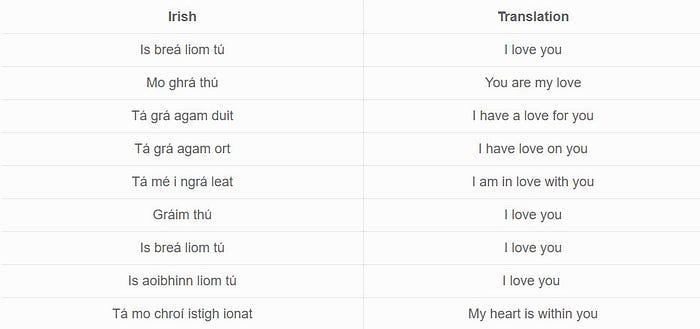There are several ways to say I love you in Irish, but one of the most common romantic ways to express this is by saying tá mé i ngrá leat. Unlike other languages, the Irish Gaelic is actually pretty complicated in the sense that you probably realized that there are a number of translations for a specific expression. For instance, the translation I just gave is just one of the many ways that will surely keep your sweetheart’s pulse and heartbeat raging. Interested in speaking like a native speaker impress your partner? Then let’s get it on!
Suppose there is one language in the world that holds an amazing history and wholly reflects the culture of Ireland. In fact, it is so unique since its first use can be traced back to the ancient Celtic people of Europe and the ogham inscriptions from the 5th century! The language is also known as Erse or Gaelic and is one of the national languages used in Ireland. While it is considered the first-ever official language of the country, English is still more commonly used, and it appears that only about 39.8% of the population can speak it fluently.
With such a low number of native speakers, a number of people are fussing around for what it means for the state of the language: is it dying soon? While most people are posting fear-mongering comments saying that the Irish language will die out, it is still alive! It remains to be at the heart of the country’s culture, and the people are constantly looking for ways to promote this.
And perhaps, this is the reason why you landed on this blog post. You probably would like to jump into learning how to speak this fantastic language. Worry no more because we have here why you should learn it and the most basic sweet expressions you can use for your loved ones.
Why Should You Learn The Irish Language?
In as much as we do not want to compare another language from another, we cannot deny that there is something unique and exciting about how Irish sounds. If you listen closely to the native Irish pronunciations for basic phrases, you will hear certain rolled sounds which might remind you of Spanish, Italian, and Arabic pronunciation. At present, the language is also mainly used in day-to-day conversations in the most beautiful parts of the country, such as Mayo, Kerry, Galway, and Donegal.
Aside from the beauty of how it sounds, learning the language is also a great way to connect with the Irish community. Not only are you trying to speak it with all your might, but you are bravely showing interest in helping them make their language thrive. While it is challenging to learn, it is still fun to acquire a language different from our first (or second). For instance, plain old English will tell you to say “I am hungry,” but in Irish, you can say Tá ocras orm, which means “hungry is on me.“
And our best reason why you should learn the Irish language? You get to help in ensuring that the language stays alive from across the world. Despite not being Irish by blood, you will get to connect with their heritage and inspire other people to learn this ancient language.
You see, learning it is definitely not a minute undertaking. It might take you months to even years until you acquire the native accent. However, you can become confident in this by simply setting aside time actually to learn the intricacies and grammar points.
How To Say I Love You In Irish
There is actually not direct phrase or word that translates to I love you for this language. However, there are other romantic options and our top 10 Iris ways are listed below

And of course, we will not leave you to dry out on your own as we also a few more practical oh-so-sweet phrases and words that you can use related to your feelings. Some of the listed below also can be used as an expression which I love you too!
So, which of these sweet words are you going to use with your sweetheart? If you enjoyed this romantic post, feel free to read our other posts, like how to say happy birthday greetings. Feel free to share this on social media and help us reach other language enthusiasts out there!
As you reach this part of the post, you are probably wondering if there are other ways by which you learn and practice the Irish language for free. And guess what? We’ve got you covered! Contrary to the usual belief, you can actually learn a language without spending on expensive courses or purchasing a number of books (that usually teaches with literal words)! In fact, you can use your mobile app! Interested to know more? Read on below!
Learning Irish Gaelic Just Got Easier!
Looking for a visually stunning and motivating application available for free on your mobile devices? We highly recommend that you check out the Ling App and Simply Learn developed by Simya Solutions.
The Ling App- An All-In-One App For Over 60+ Languages!
This app is a fun and completely interactive way to learn a new language from the ground up. It is available in both a web-based and an app-based format, allowing anyone to learn regardless of their device. It offers a fantastic collection of free lessons, review materials, challenging games, quizzes, and test materials. It is ideal for beginners and professionals who are willing to set aside at least 10 minutes a day to review and practice your target language. Not only will you learn words and phrases, but it will also teach you critical points such as grammar and the cultural meaning of certain expressions.
Simply Learn- An Application Tailored To Support Your Learning!
This mobile app does not require a subscription and contains a whole range of updated content that will help you out in speaking the language right away. This is ideal for tourists as it teaches specific phrases and expressions depending on the situation. Each included phrase comes with an audio file so that you can practice, hear, and imitate how native speakers say it.
Start learning today on the right foot by downloading the Ling App and Simply Learn today!


































































